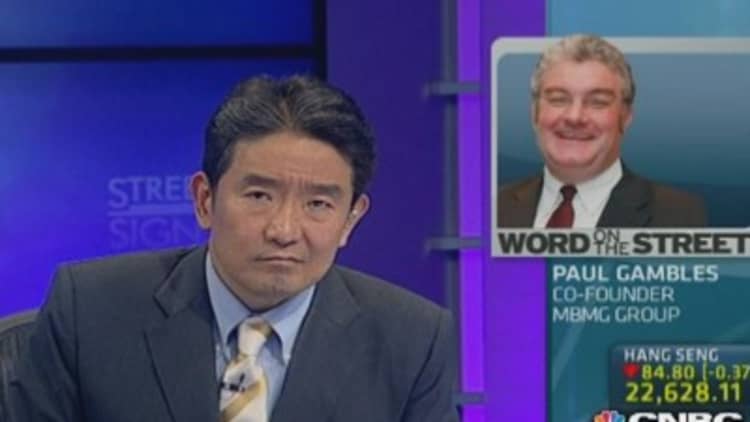
Economists are putting their forecasts for Thailand under the knife after the economy contracted more than expected in the first quarter amid continued political turmoil.
"Investment has taken a big hit. Investors have really lost confidence in the country," Daniel Martin, an economist at Capital Economics, told CNBC Monday. The political situation may have become more tense, with the military declaring martial law early Tuesday. An announcement on military-run television was made to "restore order" and was not a coup, Agence France Press reported.
"Even though the crisis doesn't seem to have affected the way of life around much of the country, consumers have really lost confidence as well," Martin said before the release of data Monday showing Thailand's gross domestic product (GDP) contracted 2.1 percent from the previous quarter, worse than the 1.6 percent contraction forecast in a Reuters poll of economists.
Read More Thai economy shrank 2.1% in first quarter, unrest threatens recession
"Unless a resolution to the political crisis is found soon, GDP growth in the second quarter may not be much better," Capital Economics said in a note after the data's release.
Political deadlock has gripped Southeast Asia's second-largest economy after Indonesia since late last year. Following months of political turmoil, Thailand's Constitutional Court ruled to remove Prime Minister Yingluck Shinawatra earlier this month.
The Election Commission has thrown cold water on hopes an election scheduled for July 20 will go ahead. The Senate is considering appointing an unelected interim government, a move likely to inflame tensions with the elected government's supporters.
Capital Economics expects to cut its already below-consensus 2.0 percent economic growth forecast this year within a couple of weeks, assuming the political situation hasn't been resolved.
Thailand's state-planning agency, which produces the GDP data, hasn't waited, saying Monday it cut its growth forecast for the year to 1.5-2.5 percent from 3.0-4.0 percent.
Among the banks, Goldman Sachs didn't even wait for Monday's GDP data. Last week, it cut its growth forecast to 1.0 percent for the year, down from 2.7 percent.
Read More Is political violence in Thailand set to spiral?
"The economy is already suffering from weaker government spending, a falloff in private investment, and flagging consumer sentiment," Goldman said. "A prolonged period where government authority is either uncertain, or focused primarily on political reform rather than economic matters, is likely to be negative for both government spending and private investment."
Even if a political resolution emerges soon, some believe it may already be too late to regain foreign investors' confidence.
Read More Politics won't derail Thai markets: stock exchange
Martin noted that companies which help investors develop projects in Thailand have seen a drop off in new investment. In the first quarter, investment fell nearly 10 percent from the year-earlier period.
"This latest flare up that started in November is just one more stage in a crisis that's been going on since 2006. There's real divides in the country," he said. "Investors know at any time this could flare up even if we see a short-term solution over the next month. That's going to be a real downer on companies that might otherwise have been interested in moving into the country and making it a base of operations."

To be sure, some have noted that funds don't seem to be flowing out of the country at this point.
"There's actually been inflows over the past few days because people have been expecting that the GDP numbers were going to be bad, so they're expecting interest rate cuts," said Paul Gambles, managing partner at MBMG International, which has around $227 million under management. "We've seen more buying of Thai bonds over the last few days than any other southeast Asian bond."
Gambles also believes the political stalemate is only one of three drivers for the drop in GDP. Thailand's exports took a hit from the weather-driven economic slowdown in the U.S. in the first quarter as well as slowing exports in China, he said.
Read More What's next for Thai economy following Yingluck sacking?
In addition, "the Thai economy has been slowing anyway since about a year ago because of the sheer amount of debt taken on board in 2012,"Gambles said. "It's impossible to keep expanding consumer debt. That's starting to bite as well."
Whatever the drivers for the economic contraction, economists aren't expecting much of a turnaround.
On Monday, Barclays cut its GDP forecast for the year to 2.0 percent from 3.0 percent, noting private consumption has fallen to levels not seen since the Asian financial crisis in the late 1990s.
Peer Credit Suisse is also getting ready to take out the scalpel, saying Monday its forecast for 2 percent growth was based on the assumption there would be a fully functioning government by the third quarter.
"This political stalemate has already dragged on for longer than we had assumed. Hence, the fiscal drag on growth and negative impact on business sentiment is likely to be larger than we had previously thought," Credit Suisse said.
—By CNBC.Com's Leslie Shaffer; Follow her on Twitter @LeslieShaffer1

